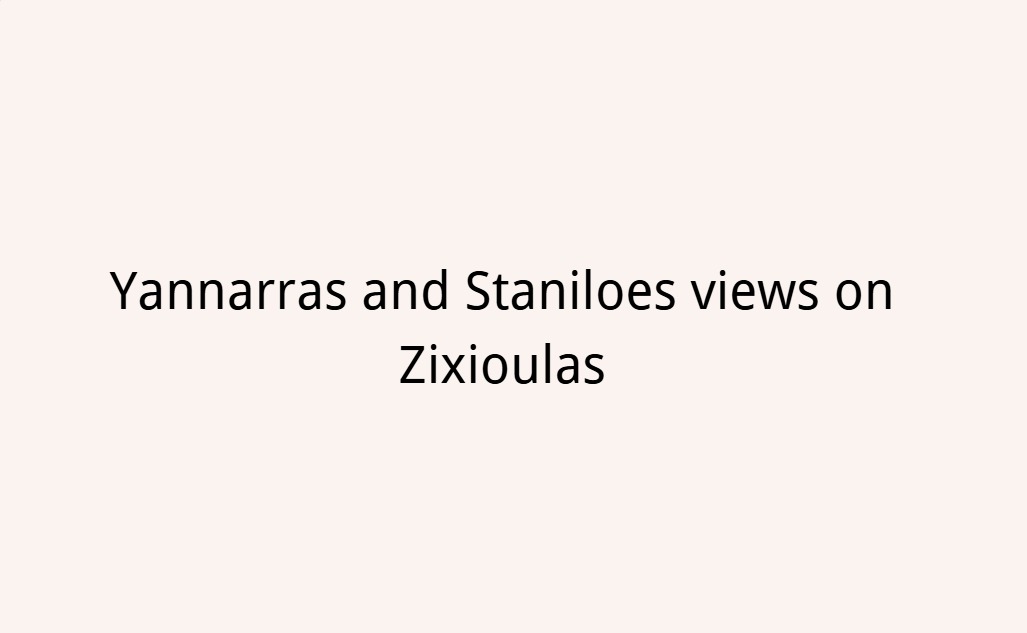Here’s a detailed analysis of how **Christos Yannaras** and **Dumitru Stăniloae** engaged with **John Zizioulas’s theology**, highlighting points of convergence and critical divergence within the Eastern Orthodox tradition:
—
### **Christos Yannaras (b. 1935) on Zizioulas**
Yannaras—a philosophical theologian deeply influenced by Heidegger—shares Zizioulas’s core commitment to **personhood** and **relational ontology** but critiques his methodology and ecclesiological emphasis.
#### **Agreements:**
1. **Anti-Individualism:**
Both reject Western “ontological individualism,” arguing that true existence (*hypostasis*) emerges only in **relational freedom**.
2. **Personhood over Essence:**
They prioritize *person* (πρόσωπον) over *nature* (φύσις), drawing from Cappadocian Trinitarian theology.
3. **Trinitarian Model:**
Human communion reflects the perichoretic love of the Trinity.
#### **Critiques:**
1. **Over-Institutionalized Ecclesiology:**
– Yannaras argues Zizioulas **overemphasizes institutional structures** (e.g., episcopacy, sacraments) as guarantors of communion.
– For Yannaras, the Church is primarily an **existential event of loving freedom**, not a juridical entity (*The Freedom of Morality*).
2. **Neglect of Ascetic Existentialism:**
– Yannaras prioritizes **ascetic struggle** (e.g., *hesychia*) as the path to personhood, whereas Zizioulas centers the Eucharist.
– He warns that Zizioulas’s framework risks reducing personhood to “ecclesial membership” rather than **lived freedom** (*Person and Eros*).
3. **Philosophical Inconsistency:**
– Criticizes Zizioulas for blending patristic theology with “Western” existential categories (e.g., Heidegger’s *Dasein* is absent in Zizioulas).
– Yannaras: *”Zizioulas’s personhood is a theological concept without a clear existential foundation.”*
#### **Yannaras’s Alternative:**
– **Personhood as Erotic Relation:** True being arises from *eros* (desire for transcendence in relation), not institutional belonging (*Relational Ontology*, 2011).
– **Church as Event:** The Church manifests where freedom and love disrupt institutional rigidity.
—
### **Dumitru Stăniloae (1903–1993) on Zizioulas**
Stăniloae—a synthesizer of patristic theology and modern thought—largely *aligns* with Zizioulas but expands his vision to include **cosmic redemption** and **experiential grace**.
#### **Agreements:**
1. **Communion as Ontology:**
Both affirm that being is constituted by relationality (*koinonia*), rooted in the Trinity.
2. **Christocentric Anthropology:**
Human personhood is realized only in Christ (*The Experience of God*, Vol. 2).
3. **Rejection of Scholasticism:**
Both critique Western substance-metaphysics for isolating beings.
#### **Nuanced Expansions:**
1. **Cosmic Dimension:**
– Stăniloae insists that communion extends to **all creation** (Rom 8:19–22). Nature participates in God’s energies (*logoi*), not just humans.
– Contrast: Zizioulas focuses almost exclusively on *human* personhood, calling nature “hypostasis-less” (a view Stăniloae rejects).
2. **Grace as Uncreated Energies:**
– Stăniloae emphasizes **experiential communion** with God’s energies (following Palamas), whereas Zizioulas stresses *ecclesial mediation*.
– For Stăniloae, grace permeates creation; for Zizioulas, it is channeled through the Church.
3. **Asceticism and Mysticism:**
– Stăniloae integrates **mystical prayer** and asceticism as essential to relational ontology, while Zizioulas prioritizes sacraments.
#### **Implicit Critique:**
– **Ecclesiological Inclusivity:** Stăniloae’s cosmic vision challenges Zizioulas’s tighter focus on the Church as the *sole* space for true personhood.
– **Sophianic Harmony:** Stăniloae sees creation as inherently graced by divine Wisdom (*Sophia*), avoiding Zizioulas’s sharper nature/person dichotomy.
—
### **Comparative Summary**
| **Theme** | **Yannaras on Zizioulas** | **Stăniloae on Zizioulas** |
|————————–|–
| **Personhood** | *Agrees* on relationality; *critiques* institutional reduction. | *Agrees* but expands to cosmic participation. |
| **Ecclesiology** | Church = **existential freedom event** (vs. Z’s structure). | Church = **sacrament of cosmic communion**. |
| **Nature/Creation** | Less emphasis; focuses on human relationality. | *Critiques* neglect of creation’s grace. |
| **Path to Theosis** | Asceticism > Sacraments. | Integrates sacraments, prayer, *and* creation.|
| **Philosophical Ground** | Demands existential consistency. | Prefers patristic synthesis over innovation. |
—
### **Key Takeaway**
While **Yannaras** and **Stăniloae** affirm Zizioulas’s Trinitarian-personalist revival, they push Orthodox thought in distinct directions:
– **Yannaras** fears Zizioulas’s model **sacralizes institutionalism**, risking the very individualism it opposes.
– **Stăniloae** urges a **broader vision of communion** embracing the cosmos.
Together, they represent the dynamic, self-critical spirit of modern Orthodox theology—united in core vision yet diversely faithful to the “whole Christ” (Maximus Confessor).




